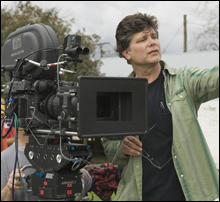
ELEPHANT WALK: For better or worse, Zaillian remains faithful to the text. |
Anybody who’s read Robert Penn Warren’s All the King’s Men in a lit class remembers at the very least that it was set in the ’30s during the Depression. Some might recall that it draws on the life of Huey Long, the Louisiana governor and senator who was assassinated in 1935. But if you watch Steve Zaillian’s adaptation and look closely at the license plates, you’ll notice the date: 1954.“I did that,” Zaillian says, “because I felt that this story could take place at any time. I didn’t want people to say, ‘Oh, well that was the Depression.’ The music and the cars are the only clues, really. And I didn’t want it to feel nostalgic or anachronistic at all.”
Timeless, in other words, like Greek tragedy. Timeless also in the sense of, when is this film going to be released? It was shot in pre-Katrina Louisiana, with an opening date in November of 2005, nicely poised for Oscar consideration. Then the studio pulled it off the schedule and rumors started to fly.
“What went on was, well, I love to edit. But our schedule was delayed before I started shooting. We were supposed to start in September, which would have given me enough time to get to edit, and then we delayed the shooting to December and we kept the date, and we were coming up on it and I just wasn’t done. I wasn’t done editing, and I still had to look through all the film I’d shot, we kind of flung it together.”
Zaillian asked for a year and got it. One thing he worked out in that time was the film’s overall structure. A classical structure, in this case epic, not tragic. “One thing that we did was we moved things around in a way that I think ended up being better than what we started with. The book starts with him [Jack] going out to his home town and then visiting his father and then going out again, and then the thing with the judge comes up, and so on. And I had it like that in the film too for a while, and I saw that that scene with the judge was such an important scene, such a great scene, it’s like a five-minute scene, but nobody really knows the characters well enough to understand what was going on. So just saving the idea of going out there but not showing what happens until later in the film, sort of catching up with the story midway through the film at that point, that was one of the things that came out, that happened in the editing.”
Speaking of classics: one film Zaillian has yet to see is Robert Rossen’s 1949 version of All the Kings Men, which won Oscars for Best Picture, Best Actor for Broderick Crawford as Willy Stark, and Best Supporting Actress for the inimitable Mercedes McCambridge as Stark’s hard-bitten assistant, Sadie Burke.
“It’s not the best thing in the world to remake great films,” Zaillian acknowledges. “Like, ‘Let’s redo Citizen Kane!’ I had no interest in doing that, in fact, it was kind of the big elephant in the room. It was a big liability, the fact that it [the old version] existed. The only way I could deal with it was to not even go see it. Luckily I hadn’t already seen it.